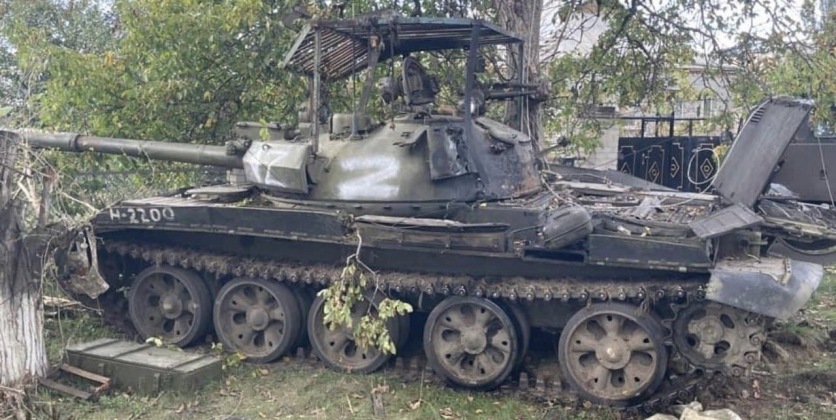News
Was Abandoning Kherson City the Right Move? The View From Russia

On November 9 Russian Defence Minister Sergei Shoigu gave orders to withdraw forces from the port city of Kherson, the capital of Kherson Province, allowing the Ukrainian Military to achieve its primary objective in its months long westward advance. Although internationally recognised as part of Ukraine, the province was officially absorbed into the Russian state in September which it had historically been under until the Soviet era. Ukrainian ground units began to enter the city on November 11, while Russian Army units were ordered to set up new defences on the eastern side of the Dnieper river. The withdrawal from Kherson followed the appointment of a new commander of Russian forces in Ukraine, General Sergei Surovikin, who reportedly personally advised Defence Minister Shoigu against holding the city on the basis that its position was far less defensible than holding ground across the Dnieper. This decision was in line with Surovikin’s broader emphasis on conserving resources and manpower, even if at the expense of territory, in what a number of analysts have seen as an effort to draw out Ukrainian forces. The city of Genichesk was subsequently declared as a provisional regional capital on November 12, a day after Russian forces completed their withdrawal, although the decision to even temporarily abandon Kherson, which under the Russian constitution had from September been considered the capital of an important province, has been highly controversial within the country.
Key figures in Russian politics have defended the decision to withdraw on the basis that conserving the country’s now limited frontline manpower, while mobilisation and rearmament continue to expand the strength of the Russian Army considerably, could make future offensives in the coming months easier while avoiding unnecessary casualties or damage to the city until then. U.S. Military reports citing the Russian Army’s limited logistical capabilities and inability to mount large scale offensives with long supply lines, have also been cited by a number of analysts as an indication of why withdrawal may have been a better decision. Supporters of the withdrawal have highlighted that Russian forces will be able to better wear their adversaries down from the east of the Dnieper, where Russian supplies will not need to cross water and will thus be far less vulnerable to attack.
Chechen leader Ramzan Kadyrov, who had long been a leading critic of how the war effort in Ukraine had been pursued, expressed “full agreement” with the “difficult but fair” decision to withdraw. “Surovikin both spares his soldiers and takes a more advantageous, comfortable and safe strategic position,” he stated. He nevertheless questioned why building up more robust supply lines into Kherson “wasn’t done from the start.” Head of the state news network RT, Margarita Simonyan, meanwhile stressed that the withdrawal was vital to avoid a situation where Ukrainian forces could gain momentum to launch an assault on the Crimean Peninsula – the most strategically critical part of Ukraine which was absorbed into Russia in 2014. After the capture of Kherson, Ukrainian forces positioned themselves just 100km away from the peninsula. Simonyan compared the withdrawal from Kherson to that overseen by General Mikhail Kutuzov in 1812 from Moscow, allowing a French invasion force to temporarily capture the city but ultimately guaranteeing a French defeat.
A less optimistic statement was attributed to prominent Russian philosopher Alexander Dugin, a leading supporter of the war effort whose daughter was killed in a failed Ukrainian assassination attempted against him in August. He stated regarding the setback: “Kherson is surrendered. A Russian city was surrender, the capital of one of the regions of Russia – the same as Belgorod, Kursk, Donetsk or Simferopol. If you don’t care, then you are not Russian. Russians are now clenching their teeth in pain, weeping and suffering as if their hearts were torn out, their children, brothers, mothers and wives were killed in front of their eyes. If you aren’t hurting now, you’re nothing.” Although a number of Western reports claimed Dugin was calling for the Russian leadership to step down, he personally denied having done so. His sentiments reflected those of many nationalists in the country, as while it was likely the most militarily sound decision the withdrawal from Kherson was nevertheless highly symbolic as a defeat.

Russian reports claimed that there had been “no loss of personnel, weapons, vehicles, or materiel” during the withdrawal, that “all civilians who wished to leave the right bank of Kherson Region were provided with assistance,” and that 33 rockets fired on withdrawing forces and civilians by U.S.-supplied HIMARS rocket artillery systems were intercepted or electronically diverted. The future of the Russian-Ukrainian War, the ability of Ukrainian forces to hold Kherson through the winter months, and the effectiveness of Russia’s reported plans for future offensives to retake recently lost territory all remain uncertain, as does Ukraine’s ability to continue to supply its forces so far from its borders with Poland and Romania from where the bulk of its supplies are delivered. The inability of Ukrainian aircraft to operate over the country’s territory, particularly in the eastern regions, is expected to only make resupply efforts more difficult, with Russia’s ability to strike Ukrainian logistics expected to continue to expand as new deliveries of Iranian drones and short ranged ballistic missiles are reportedly imminent.












